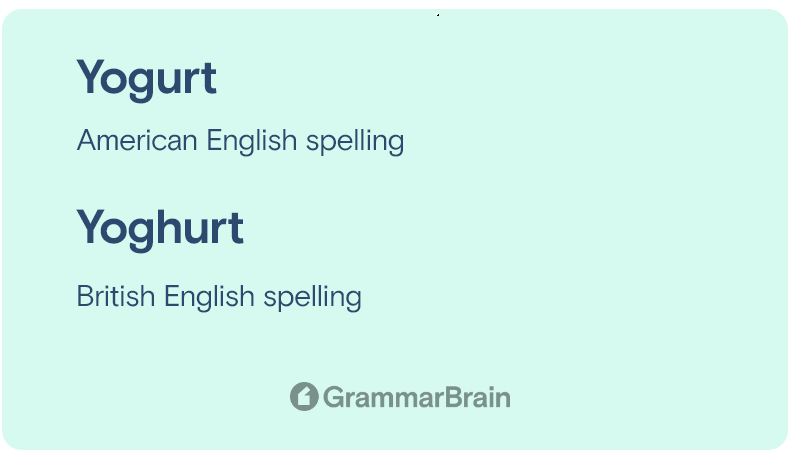Is it yogurt or yoghurt? Does Mary buy yoghurt from the market or does she buy yogurt? Does your mother make yoghurt from milk or does she make yogurt? If these questions have been troubling you, we are here to clear these doubts once and for all. Let us look at how the two words are separate, if at all.
Yogurt vs yoghurt definition and meaning
What is yogurt? Yogurt is a noun that refers to a dairy product or a food item produced through the fermentation of milk. It is a sour item that can be had as a snack at any time of the day. This dairy product is originally from Turkey, where the Turks preferred to have their milk sour.
| Word | Definition |
| Yoghurt | a semisolid food prepared from milk fermented by added bacteria, often sweetened and flavored. |
| Yogurt | a semisolid food prepared from milk fermented by added bacteria, often sweetened and flavored. |
Today we make yogurt through the process of fermentation using bacteria like certain strains of the common Lactobacillus. The easiest way to make yogurt is to add some existing yogurt to a bowl of warm milk and leave it to set for a couple of hours.

Difference between yoghurt and yogurt
Yoghurt and yogurt are two different spellings used to describe the same thing so there is no
difference as such. It is much like the difference between ‘color’ and ‘colour’ and ‘flavor’ and ‘flavour’. The dairy product would not taste any different based on how you spell it. The only difference lies in the audience that you are addressing. The word, like the product, has Turkish origin. Later, the British adapted the word into their vocabulary.
Over the years different regions have spelled the word in myriad ways. ‘Yoghurt’ is used in British English, so while speaking to a British audience, you would want to use the extra ‘h’ in the word. ‘Yogurt’ is the Americanization of the word and is used widely in the North American nations of USA and Canada. There are still people in America who might spell it as
yoghurt. But yogurt is currently being accepted across the globe as the modern spelling of the word, even in Britain. Most people prefer to use the American version as it is the listed spelling in most
online libraries. However, note that both spellings are correct. It holds little significance as to which word you ultimately use.
It is however advisable to select the spelling according to the audience you will be addressing.
Examples of use in sentences
Yoghurt:
- She preferred making her own yoghurt instead of buying it.
- The new organic yoghurt available at the supermarkets is a healthier option.
- The man was looking to try some flavored yoghurt at the dairy farm he came across on his trip.
Yogurt:
- Charles learnt how to make blueberry yogurt from the internet.
- Terry loved yogurt so much that he got a mini fridge only for that.
- My mother decided to add yogurt to the grocery list at the last moment.
Conclusion on yoghurt vs yogurt
Yoghurt and yogurt are two ways of spelling the same word and there is no significant difference
between them. Different regions of the world use either of the two spellings and both are correct. While yoghurt is used in British English, yogurt is the American way to spell it.
The American version is widely used everywhere across the world today. So if you want to play it safe, you can use yogurt. Even you use the extra ‘h’ in the word, you are still correct.
Inside this article
Fact checked:
Content is rigorously reviewed by a team of qualified and experienced fact checkers. Fact checkers review articles for factual accuracy, relevance, and timeliness. Learn more.
Core lessons
Glossary
- Abstract Noun
- Accusative Case
- Anecdote
- Antonym
- Active Sentence
- Adverb
- Adjective
- Allegory
- Alliteration
- Adjective Clause
- Adjective Phrase
- Ampersand
- Anastrophe
- Adverbial Clause
- Appositive Phrase
- Clause
- Compound Adjective
- Complex Sentence
- Compound Words
- Compound Predicate
- Common Noun
- Comparative Adjective
- Comparative and Superlative
- Compound Noun
- Compound Subject
- Compound Sentence
- Copular Verb
- Collective Noun
- Colloquialism
- Conciseness
- Consonance
- Conditional
- Concrete Noun
- Conjunction
- Conjugation
- Conditional Sentence
- Comma Splice
- Correlative Conjunction
- Coordinating Conjunction
- Coordinate Adjective
- Cumulative Adjective
- Dative Case
- Determiner
- Declarative Sentence
- Declarative Statement
- Direct Object Pronoun
- Direct Object
- Diction
- Diphthong
- Dangling Modifier
- Demonstrative Pronoun
- Demonstrative Adjective
- Direct Characterization
- Definite Article
- Doublespeak
- False Dilemma Fallacy
- Future Perfect Progressive
- Future Simple
- Future Perfect Continuous
- Future Perfect
- First Conditional
- Irregular Adjective
- Irregular Verb
- Imperative Sentence
- Indefinite Article
- Intransitive Verb
- Introductory Phrase
- Indefinite Pronoun
- Indirect Characterization
- Interrogative Sentence
- Intensive Pronoun
- Inanimate Object
- Indefinite Tense
- Infinitive Phrase
- Interjection
- Intensifier
- Infinitive
- Indicative Mood
- Participle
- Parallelism
- Prepositional Phrase
- Past Simple Tense
- Past Continuous Tense
- Past Perfect Tense
- Past Progressive Tense
- Present Simple Tense
- Present Perfect Tense
- Personal Pronoun
- Personification
- Persuasive Writing
- Parallel Structure
- Phrasal Verb
- Predicate Adjective
- Predicate Nominative
- Phonetic Language
- Plural Noun
- Punctuation
- Punctuation Marks
- Preposition
- Preposition of Place
- Parts of Speech
- Possessive Adjective
- Possessive Determiner
- Possessive Case
- Possessive Noun
- Proper Adjective
- Proper Noun
- Present Participle
- Prefix
- Predicate



